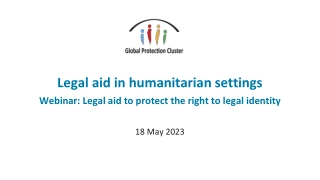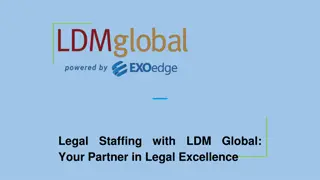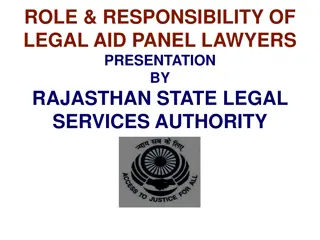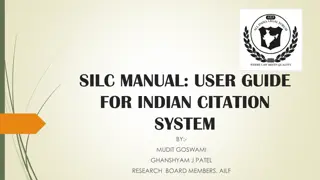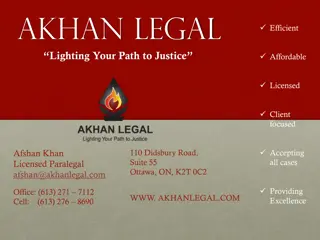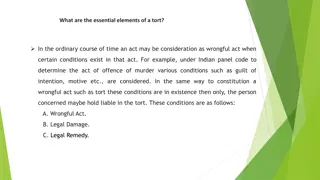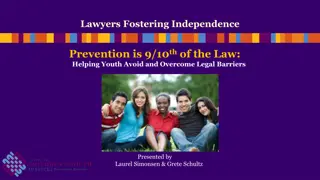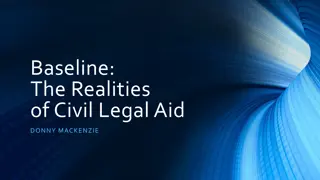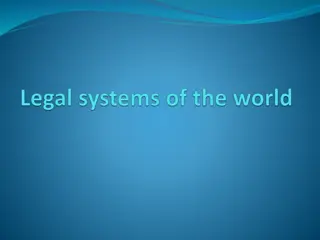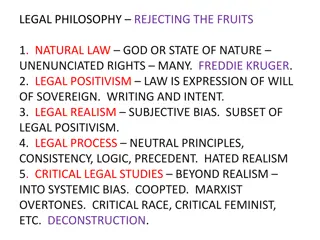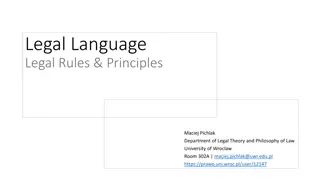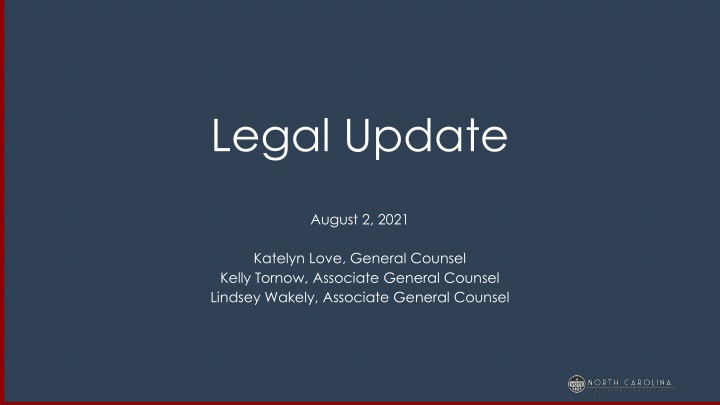
Legal Update August 2021: Litigation, Accessibility Changes, Election Law Updates
Stay informed with the latest legal updates for August 2021, featuring details on ongoing litigation cases, accessibility changes, absentee election law updates, municipal elections, and new campaign finance rules. Explore significant developments in Photo ID laws, ExpressVote certification, and the rights of blind absentee voters.
Download Presentation

Please find below an Image/Link to download the presentation.
The content on the website is provided AS IS for your information and personal use only. It may not be sold, licensed, or shared on other websites without obtaining consent from the author. If you encounter any issues during the download, it is possible that the publisher has removed the file from their server.
You are allowed to download the files provided on this website for personal or commercial use, subject to the condition that they are used lawfully. All files are the property of their respective owners.
The content on the website is provided AS IS for your information and personal use only. It may not be sold, licensed, or shared on other websites without obtaining consent from the author.
E N D
Presentation Transcript
Legal Update August 2, 2021 Katelyn Love, General Counsel Kelly Tornow, Associate General Counsel Lindsey Wakely, Associate General Counsel
Overview 1. Litigation Update 2. Accessibility Changes 3. Absentee Election Law Changes and the Cure Process 4. Municipal Elections 5. New Campaign Finance Rules
Your Law Book its already outdated Laws added from 2019 to present not included. Numerous court cases have changed the law. For example: Photo ID law currently enjoined Same-day registration, pre-registration, 17-year-olds voting in primary, out-of-precinct voting Validity and submission of absentee request form Felon eligibility Absentee request portal Uniform one-stop hours requirement Check Election Law Index and numbered memos for updates.
Litigation Update (17 active lawsuits)
Photo ID Status: Photo ID Law currently enjoined by state court Holmes v. Moore (3-judge panel, Wake County Superior Court) State constitutional challenge to photo ID law Preliminary injunction issued in 2020, remains in place Trial held April 12-30, 2021 Waiting on ruling from 3-judge panel NAACP v. Cooper (MDNC) Federal constitutional challenge to photo ID law Preliminary injunction by district court reversed on appeal 4th Circuit en banc determined legislature could not intervene Trial scheduled for January 2022
ExpressVote ExpressVote certified for use in North Carolina. County boards may choose voting systems from either vendor certified in North Carolina. NAACP v. State Board (Wake County Superior Court) Constitutional challenge to the use of ExpressVote NCDOJ defending State Board and 21 county boards Preliminary injunction request denied in 2020 Hearing on summary judgment to take place in mid August
Blind Absentee Voters Taliaferro v. State Board (EDNC) Lawsuit under ADA by blind voters seeking to vote absentee independently. Preliminary injunction issued on in October 2020 requiring online portal for blind voters via Democracy Live. Court granted permanent injunction in June 2021. Requires online portal and other changes to provide greater accessibility for blind voters. Implementation ongoing. Regular reports required to court and plaintiffs re implementation.
Felon Rights Community Success Initiative v. Berger (3-judge panel, Wake County Superior Court) Constitutional challenge to ban on voting by felons not currently incarcerated Court issued injunction in September 2020 SBE may not prevent anyone from voting whose supervision period was extended due to failure to pay fines/fees from their sentence. See Numbered Memo 2020-26. Trial scheduled for mid August 2021 A. Phillip Randolph Institute v. State Board (MDNC) Challenge to law making in a strict-liability criminal offense to vote while still serving a felony sentence
Other Democracy NC v. State Board (MDNC) Constitutional challenge to various voter registration, absentee ballot, and early voting rules in light of pandemic Preliminary injunction issued in August 2020 Plaintiffs recently revised their complaint to remove claims regarding the pandemic; claims remain about due process and absentee assistance restrictions Cure process revised via Numbered Memo 2021-03 in June 2021. Modifies process for curing deficient absentee ballots. NC Democratic Party v. State Board (3-judge panel, Wake County Superior Court) Challenge to early voting restrictions
How Can You Help Prevent Litigation? Keep up with list maintenance. Ensure polling places are ADA compliant. Retain records according to the schedule. Destroy properly when no longer required to retain. Respond to public records requests promptly. Keep in touch with requestor if the production is slow.
How Can You Help Prevent Litigation? Properly research each provisional application (Numbered Memo 2018-05). Comply with open meetings laws (notice and public access). Follow cure process for deficient absentee ballots. Follow required procedures for protests and challenges. Involve county attorney early. Process same-day registrations within 48 hours.
How Can You Help Prevent Litigation? Don t allow voter challenges based on change of residence or non-individualized evidence within 90 days of a federal election (Numbered Memo 2018-07). Follow all numbered memos and ask questions if you don t understand. Notify your county attorney (and SBE Legal) if you are concerned about possible litigation.
Accessible Absentee Voting Blind voters can Request an absentee ballot on the Democracy Live portal Receive, mark and return their ballot on the portal Cast a demo ballot with fictitious names on the portal View their accessible sample ballot https://votebymail.ncsbe.gov/
Requests for Accessible Voting Formats Blind voters for whom the portal is not effective may request an alternative format of their absentee ballot that includes, but is not limited to, Large Print, Braille, and audio formats, which will be promptly processed by the State Board as a request for effective communication under the ADA and Section 504 of Rehabilitation Act. State Board identifying vendor that can make large print and braille ballots.
Accessibility Policy State Board is adopting an accessibility policy. It will include providing prompt and timely equal access to absentee voting for people with disabilities. Will issue accessibility policy in a numbered memo. ADA Coordinator will receive and resolve questions and complaints about the accessibility of the voting process for people with disabilities. ADA Coordinator: Matt Stone, Assistant Election Program Specialist
Accessible Voting Formats Order requires that the State Board provide training and support to county boards on accessibility County boards must: Be adequately informed of all accessible voting formats. Acknowledge and process requests for accessible absentee ballots in a timely fashion. Notify ADA Coordinator immediately if they receive a request for an alternative format ballot.
Accessible Website NCSBE.gov includes instructions for accessible absentee voting: https://www.ncsbe.gov/voting/help- voters-disabilities/accessible- absentee-voting With assistance of a vendor, webpages on NCSBE.gov related to the exercise of the right to vote aimed at the public at large are being updated to be fully accessible for screen readers.
Recent Elections Law Changes Absentee Voting
Changes That Stay - Absentee Absentee request portal Online portals for UOCAVA and blind voters BallotTrax and intelligent mail barcode (BUT can t be used to satisfy postmark requirement) No signature verification of absentee request or absentee envelope Absentee board meetings start 5th Tuesday before the election (but for municipals you can cancel the two earliest ones)
Changes That Stay - Absentee Limitations on completion and return of absentee ballot request form Form invalid if returned by someone other than the voter, near relative/legal guardian, or MAT Form must indicate date of election ballot requested for Only voters who are blind, disabled or illiterate may receive assistance from someone other than a near relative, legal guardian, or MAT Must disclose who assisted if someone other than the near relative or legal guardian Pre-populated absentee request forms not permitted Form must contain voter s DMV ID or SSN4 (no HAVA document to satisfy this requirement)
Changes That Are Out - Absentee x Only 1 witness required Going back to 2 witnesses or a notary New absentee envelopes will be needed for 2021 elections x Return of absentee request form by email or fax Only UOCAVA voters may continue to return requests by email or fax (in addition to new portal) x Requirement that MAT team assist any voter requesting assistance MATs must still be available to assist voters in covered facilities
Changes That Are Out - Absentee x Waiver of some log requirements for in-person return of absentee requests and ballots x Rule 08 NCAC 18. 0102 back in full effect x Extended deadline for receipt of absentee ballots & use of BallotTrax/commercial carrier data to determine postmark The absentee return deadline for civilian ballots is back to the Friday after election. Ballottrax/commercial carrier tracking info cannot be used to satisfy postmark requirement
Numbered Memo 2021-03 By court order, State Board must provide a cure process for voters whose container-return envelopes have certain deficiencies This process replaces NM 2020-19 and applies to all elections going forward No signature verification verification of voter s identity is completed through the witness requirement County board staff must review container-return envelopes for deficiencies regularly (each business day if possible) Applies to civilian and UOCAVA voters
Types of Deficiencies Whether absentee ballot can be cured depends on whose information is missing Curable Deficiencies send Cure Certification Voter did not sign Voter Certification Voter signed in the wrong place Non-Curable Deficiencies spoil ballot and reissue Witness or assistant did not print name (but if you can determine name from signature, ballot is not deficient) Witness or assistant did not provide address see Numbered Memo 2020-29 Witness or assistant signed on wrong line (except if all required info is there) Envelope is unsealed or appears to have been tampered with Envelope indicates voter wants a new ballot
Types of Deficiencies Deficiencies that require board action (first noticed during board meeting): No ballot is in envelope Envelope contains two voters envelopes Container-return envelopes were switched Board would disapprove envelope and notify voter/reissue ballot
Cure Certification Deficiencies that require cure certification: Voter did not sign Voter Certification Voter signed in wrong place Voter swears or affirms they returned their absentee ballot and that they have not already voted Voter must print their name and sign the document If CBE receives a cure certification, the board considers the cure certification and the envelope together. Will approve absentee ballot if: Voter is otherwise eligible Cure certification timely received by a proper method and was sent by an authorized person Cure certification contains voter s name and signature
Return of Cure Certification Who can return? Voter, voter s near relative or legal guardian, or MAT If returned by any other person, it s invalid If voter is disabled, they can instruct someone to put cure certification in closest mailbox on their behalf How is it returned? By email, fax, in person, or by mail or commercial carrier When is the deadline? Must be received (not postmarked) by 5:00 PM on day before county canvass (the Monday after the municipal election)
Notifying the Voter If there are any deficiencies, CBE must send cure certification or new ballot within one business day of discovering the deficiency If the deficiency is curable, CBE will send cure certification by mail and email until day before county canvass If the deficiency is not curable, CBE will mail new ballot No ballots issued after Election Day If voter did not provide email but did provide phone number, CBE must contact voter by phone to let them know they will be receiving cure certification or new ballot in the mail
Late Ballots Ballots received after deadline are not curable If ballot received after deadline but before county canvass, mail the voter a notice explaining why ballot could not be counted If ballot received after county canvass, CBE not required to notify voter
County Canvass Dates Numbered Memo 2021-04 Canvass for the 2021 municipal elections will take place 7 days after each election (rather than 10): October 5 election: Canvass October 12 at 11AM November 2 election: Canvass November 9 at 11AM Deadlines tied to the date of county canvass (election protests, submitting abstracts, sample audits, cure certification deadline, recount requests, etc. calculated using 7-day canvass period
Session Law 2021-56 and Redistricting Moves elections for municipalities that elect by district to 2022 dates depend on election method and whether a federal second primary is needed Filing period depends on how quickly the municipality can adopt new redistricting plan Exception for at-large contests in the affected municipalities had to notify your office by July 19 County commissioners that elect by district must adopt new plan by November 17, 2021 law generally requires they adopt by 150 days before primary (October 9) Voter registration will be permitted between 1st and 2nd primaries in 2022 only
Candidate Challenges New materials added to Legal webpage Deadline to file is ten business days after candidate filing deadline or petition filing deadline Key reminders: Set date for hearing within 5 business days of receiving the challenge Get a court reporter Involve your county attorney right away Send a copy of the candidate challenge and any corresponding documents to SBE Legal Burden is on candidate (not challenger) to show they meet the constitutional and statutory qualifications, including residency
One-Stop Plans Elections in odd-numbered years have slightly different site and hour requirements from the even-numbered year elections (Session Law 2019-239) One-stop plans that exceed the statutory minimum must be unanimously approved by the county board; if not, non-unanimous plans are submitted to State Board, which adopts the plan for your county for that election Non-Unanimous Plan Due Dates: October 5 election: Friday, July 30 (State Board meeting will be held August 17) November 2 election: Friday, August 20 (State Board meeting held September 10)
One-Stop Plans For in-lieu-of site requirements and State Board criteria for considering whether the Plan disproportionately favors any party, racial or ethnic group, or candidate , see Numbered Memo 2020-13 No longer in effect: Emergency Order requiring a minimum of 10 weekend hours and a minimum number of one-stop sites based on number of registered voters, among other things
Changes That Stay County boards must publish number of provisional ballots cast by voting method by noon 2 days after the election Chair of county board must appear at SBE meeting to explain reason for a delay of 30-day precinct sort Guidance for adjudicating voter intent during a hand-to-eye sample audit or hand-to eye recount
Changes That Are Out x Only one precinct assistant must be registered voter of the precinct. Law is back to requiring a majority of precinct assistants be residents of the precinct x Only one chief judge or judge must be a resident of the precinct. Law is back to requiring a majority of precinct judges/chief judge be residents of the precinct
Proposed Campaign Finance Rules
Proposed Campaign Finance Rules Closing a Political Committee: G.S. 163-278.6(74) says that a political committee continues if it receives contributions or makes expenditures or maintains assets or liabilities. A political committee ceases to exist when it winds up its operations, disposes of its assets, and files its final report. Id.
Proposed Campaign Finance Rules 08 NCAC 21 .0202 Procedures for Closing a Committee Clarifies that in order to close the committee must file two things: (1) A certification to close; and (2) A final report. The final report must disclose no cash on hand, no outstanding loans, and no outstanding debts and obligations owed by the political committee. PLEASE NOTE: a committee that files under threshold is ONLY required to file the certification to close. The certification to close must be filed within 15 calendar days of the final report.
Proposed Campaign Finance Rules 08 NCAC 21 .0202 Procedures for Closing a Committee A committee is not permitted to close if: The committee has failed to file a report; The committee has an outstanding penalty for a late report. PLEASE NOTE: if the outstanding penalty was due more than three years ago, the State Board s ability to collect the penalty is limited, and the penalty will not prevent closure.
Proposed Campaign Finance Rules 08 NCAC 21 .0202 Procedures for Closing a Committee After filing the certification to close and final report, the committee shall be closed pending until the board of elections completes a final audit, all potential prohibited transactions are resolved, and all amended reports are filed. The State Board of Elections may order a committee closed that has not resolved potential prohibited transactions or filed amended reports. PLEASE NOTE: while closed pending, the committee is NOT required to file reports.
Proposed Campaign Finance Rules 08 NCAC 21 .0203 Certification of Threshold Establishes a formal deadline by which a committee must file a CRO-3600 Certification of Threshold in order to remain under threshold for a subsequent election cycle. Clarifies that a committee which does not file the CRO- 3600 by the deadline will be required to file all required reports for the subsequent election cycle.
Proposed Campaign Finance Rules 08 NCAC 21 .0203 Certification of Threshold Certification of Threshold Due Date: January 31st. (1) for a candidate committee with an election cycle ending on December 31 of an odd-numbered year, deadline is: January 31 of the next even-numbered year. (2) for a candidate committee with an election cycle ending on December 31 of an even-numbered year, deadline is: January 31 of the next odd-numbered year. (3) for a political party committee or affiliated party committee with an election cycle ending on December 31 of an even-numbered year, deadline is: January 31 of the next odd-numbered year.
Proposed Campaign Finance Rules 08 NCAC 21 .0203 Certification of Threshold PLEASE NOTE: this only impacts the due date for a subsequent election cycle. For a candidate who files for office in 2021 or 2022, G.S. 163-278.10A still says that the CRO-3600 Certification of Threshold shall be filed with the Board at the time the municipal or county candidate files the candidate s Organizational Report.
Proposed Campaign Finance Rules 08 NCAC 21 .0501 Billboard Definition for G.S. 163-278.39 Defines a billboard as a sign, flat surface or other display greater than 50 square feet. Example: a sign that is 5 feet by 10 feet. Specifically excludes flags or banners from the definition. Effective date is December 1, 2021 (will not apply to 2021 municipal elections).
Proposed Campaign Finance Rules 08 NCAC 21 .0501 Billboard Definition for G.S. 163-278.39 What does this mean? Only those signs that meet the definition in the rule require a disclosure legend. There is some ambiguity around flags and banners. These may still be regulated as outdoor advertising, but the State Board will likely need to define this term further.

